India's gross domestic product expanded 0.4% in the three months ended December, after contracting for two consecutive quarters, according to government data released on Friday. This will help Asia’s third-largest economy exit an unprecedented recession even as it battles new challenges posed by a surge in coronavirus infections. The country's economic growth shrank 7.5% a quarter ago and grew 4.1% in the year-ago period.
In its second advance estimates of national accounts, the National Statistical Office (NSO) has projected 8% contraction in 2020-21. In its first advance estimates released in January, it had projected a contraction of 7.7% for the current fiscal as against a growth of four% in 2019-20.
The economy had shrunk by an unprecedented 24.4% in the first quarter this fiscal following the coronavirus pandemic and resultant lockdowns. In the second quarter, the GDP contracted 7.5% due to a perk up in economic activities.
China's economy grew by 6.5% in October-December 2020, faster than the 4.9% growth in July-September 2020.
India is now one of the few major economies to post growth in the last quarter of calendar year 2020, with any improvement in the economy’s performance inversely tied to a drop in Covid-19 infections. But the country has seen an uptick in cases over the last few weeks raising the risk of a new round of localised lockdowns.
New curbs on movement of people or restrictions on businesses are a risk to the nascent recovery, given that gains in the October-December quarter probably came from the reopening of the economy, which is primarily driven by domestic consumption. In the Union Budget, announced on February 1, the government announced fiscal steps to support the economy, including a near-record borrowing in its latest budget this month.
The positive reading will lower the pressure on Reserve Bank of India, which did most of the heavy lifting in the past year through 115 basis points of interest-rate cuts and ensuring liquidity in the financial system.
“The infection caseload in some parts of the country is, however, again creeping up,” Reserve Bank of India Governor Shaktikanta Das said earlier this week. “We need to stay vigilant and steadfast, and on our toes.”
 Dear Reader,
Dear Reader,
Business Standard has always strived hard to provide up-to-date information and commentary on developments that are of interest to you and have wider political and economic implications for the country and the world. Your encouragement and constant feedback on how to improve our offering have only made our resolve and commitment to these ideals stronger. Even during these difficult times arising out of Covid-19, we continue to remain committed to keeping you informed and updated with credible news, authoritative views and incisive commentary on topical issues of relevance.
We, however, have a request.
As we battle the economic impact of the pandemic, we need your support even more, so that we can continue to offer you more quality content. Our subscription model has seen an encouraging response from many of you, who have subscribed to our online content. More subscription to our online content can only help us achieve the goals of offering you even better and more relevant content. We believe in free, fair and credible journalism. Your support through more subscriptions can help us practise the journalism to which we are committed.
Support quality journalism and subscribe to Business Standard.
Digital Editor

RECOMMENDED FOR YOU